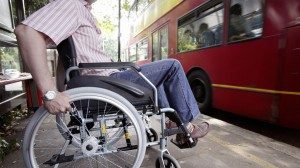Who should be given priority on a bus? A disabled person or a mother with a young child? This was the question put to a judge in Leeds last September. Now the subject of an appeal, the issue seems set to attract even more attention with even greater ramifications for the disabled community.
Last September, Doug Paulley, a wheelchair-user from Wetherby, had been prevented from getting on a bus run by First Bus Group because a mother refused to move her pushchair from the wheelchair bay for fear of waking her child. After being forced to take a later bus, Mr Paulley took First Bus Group to court, arguing disability discrimination.
First Bus Group operated a ‘first come first served’ policy in relation to spaces made available for disabled wheelchair users. Bus drivers could request that able bodied passengers who occupied wheelchair bays should move to another area of the bus. But if such a passenger refused, a bus driver could not require or force an able bodied person to make way for a disabled person.
The Judge disagreed. Finding in favour of Mr Paulley, Judge Isaacs ruled that the bus company should have done more to ensure the cliamant’s needs were accommodated. The fact that he was refused admission onto the bus was, in the eyes of the court, unlawful discrimination.
“The practice suggested by the Claimant, (Mr Paulley)” observed the judge “namely that the system of priority given to wheelchair users should be enforced as a matter not of request, to any non-disabled user of the wheelchair space, but of requirement is, to my mind, a reasonable one.”
The judge went on to state:
“Although such a policy might inconvenience a mother with a buggy that, I am afraid, is a consequence of the protection which Parliament has chosen to give to disabled wheelchair users and not to non-disabled mothers with buggies.”
Mr Paulley was awarded £5,500 and First Bus Group were told to change their policy.
This seems to me, to be a perfectly reasonable and clear decision. Although able bodied mothers are undoubtedly more vulnerable than ‘ordinary’ members of the public, the fact that they should rank behind disabled people, seems just. The Equality Act 2010 affords special protection to the physically incapacitated and the ruling chose to uphold this protection.
However, last week it emerged that First Bus Group have decided to appeal against Judge Isaac’s first instance decision, saying there is now “real uncertainty” as to how a bus company should now be expected to act in such a situation.
In my opinion, there is little uncertainty here. However, if the Court of Appeal were to overthrow the decision of Judge Isaacs, this would be a real blow for disabled people. Furthermore, it is arguable that the disability discrimination provisions contained in the Equality Act would be undermined.
In an ideal world, I would prefer such matters to be resolved by common sense and politeness rather than in a court of law. However, if the legal system is to be involved once again, I can only hope the Court of Appeal chooses to safeguard the rights of disabled people and that the statutory commitment made by Parliament to the disabled community, as enshrined in the Equality Act, remains unfettered.


Thanks for your excellent article and your support.
FirstBus have applied for permission to appeal. They need permission, it isn’t automatic. Furthermore they have asked to skip an appeal step: normally the appeal would go to High Court before the Appeals Court, but they’ve asked to go direct. In the process they have sacked their original solicitors and barrister and appointed new ones.
Legitimate grounds for appeal are limited, and there is a distinct possibility their application will be turned down, at paper and oral hearing. If not, though, funding the defence of the appeal will be difficult. Changes in funding rules make it much more difficult for disabled people to bring cases – and I may not be able to mount a defence.
Ultimately, it would be good if they do get permission to appeal, I get funding from somewhere and then I win (well, tbh, barrister and solicitor win, I am blessed with them, they are excellent) as then it is a binding, precedent setting decision. But there’s a long road ahead and none of it is straightforward.
What I think should happen is that application for appeal should be reused, which leaves us as we are now: FirstBus obliged to make changes, pay costs etc. but no precedent.
D
Thanks for the comment, Doug. I tend to agree with you. The real concern here is that an appeal which resulted in a decision in favour of FirstBus would result in a precedent which actually undermines a parliamentary statute (in this case, the Equality Act 2010). In my opinion, I’m not so sure an appeal will be granted as an appeal is normally (as I understand it) only granted on a point of law. It seems to me that the law is quite straightforward here. What FirstBus actually require is direction on how to interpret the law. In any case, it will be very interesting to see what happens.
Interesting article although I have to admit that there are aspects of this case that trouble me a wee bit.
The disabled being prioritised over able bodied mothers is fine as it goes, but it’s not really the mother that’s the issue – it’s the contents of the pram/buggy. And, depending on their age, they are arguably more helpless.
So, are we looking at a situation in the future where a 4 month old baby has to be woken up, removed from their pram so it can be folded – otherwise they will be removed from the bus?
The sensible option would be for bus stock to accommodate both, otherwise the above scenario might not go too well when it inevitably happens.
Hi Rory, thanks for your comment. I think you’re right. It’s a bit of a tricky issue. I certainly don’t like the thought of a mother of a young child being thought of as less important than a disabled person. And it would be abhorrent if she were removed from the bus in favour of the disabled gentleman. We’re dealing with two people in very vulnerable circumstances. Having said that, in this particular instance, I must admit I was disappointed that the mother was not a little more accommodating. I’d like to think that she could have woken her child to allow a less fortunate person board the bus. I really do think a solution should have been found. However, if we were dealing with someone who had two or three children or a pregnant lady, then it would be another matter altogether and if that would have meant a disabled person (or anyone, for that matter) had to wait for the next bus, then so be it. Your view that a bus should accommodate both is absolutely correct and is the common sense approach. In my opinion, it’s a pretty sorry state of affairs if the Courts need to be relied upon to resolve these issues. Thanks for taking the time to read the article and have a great weekend!